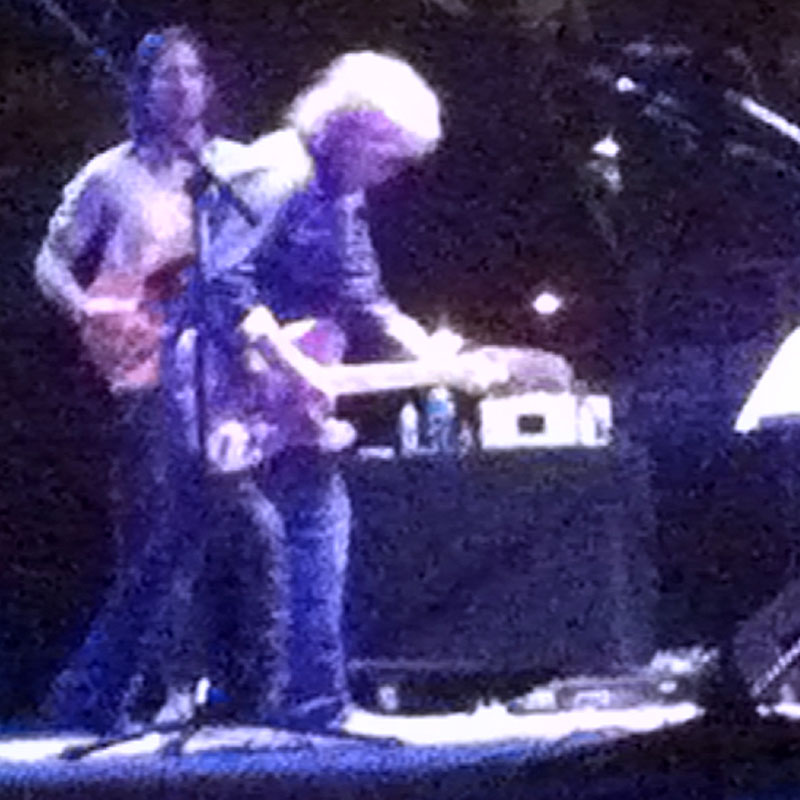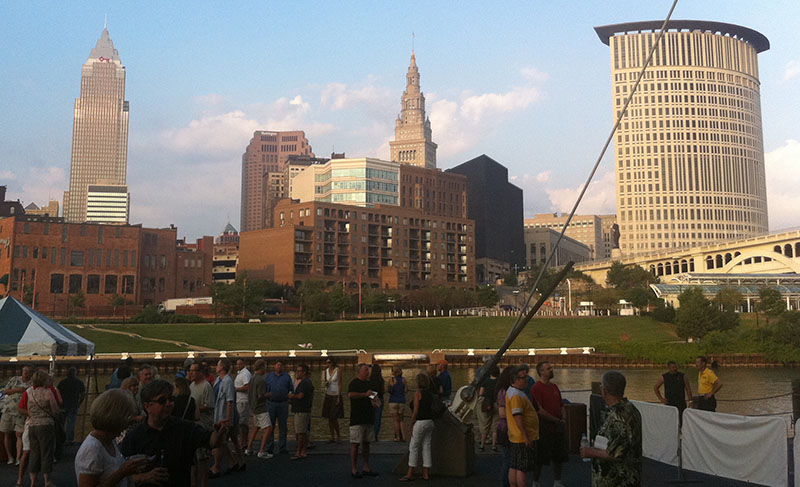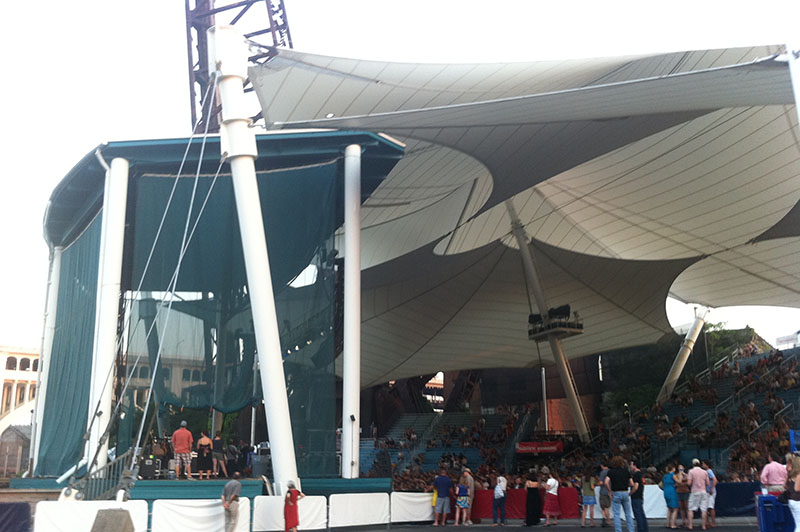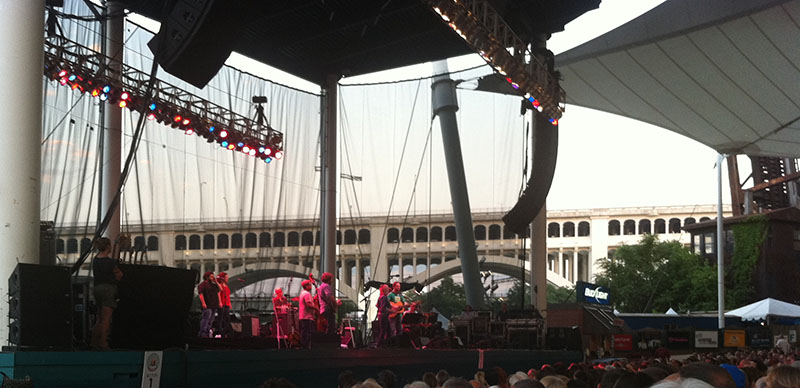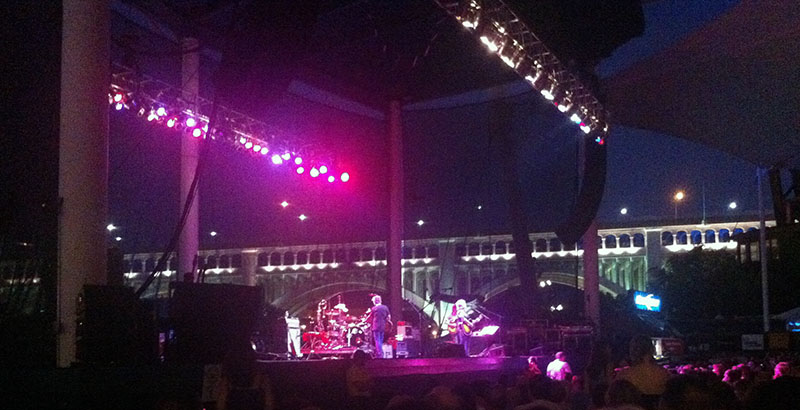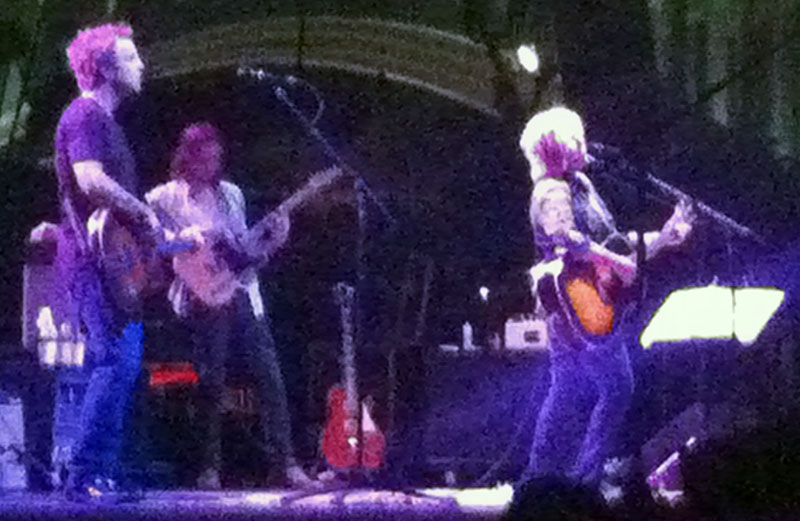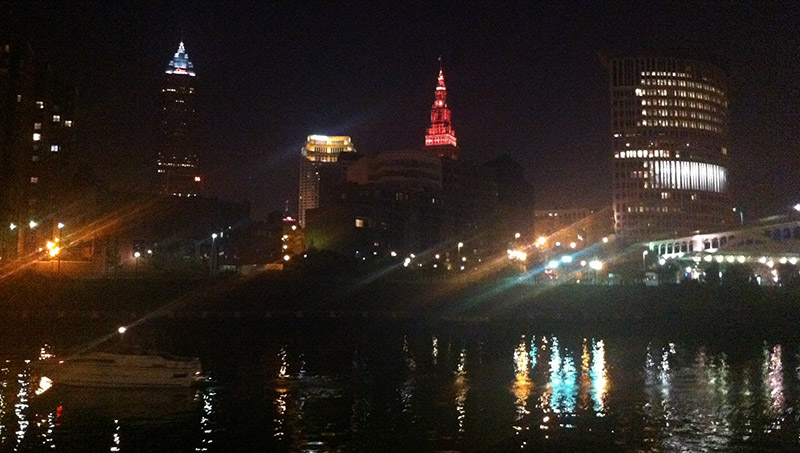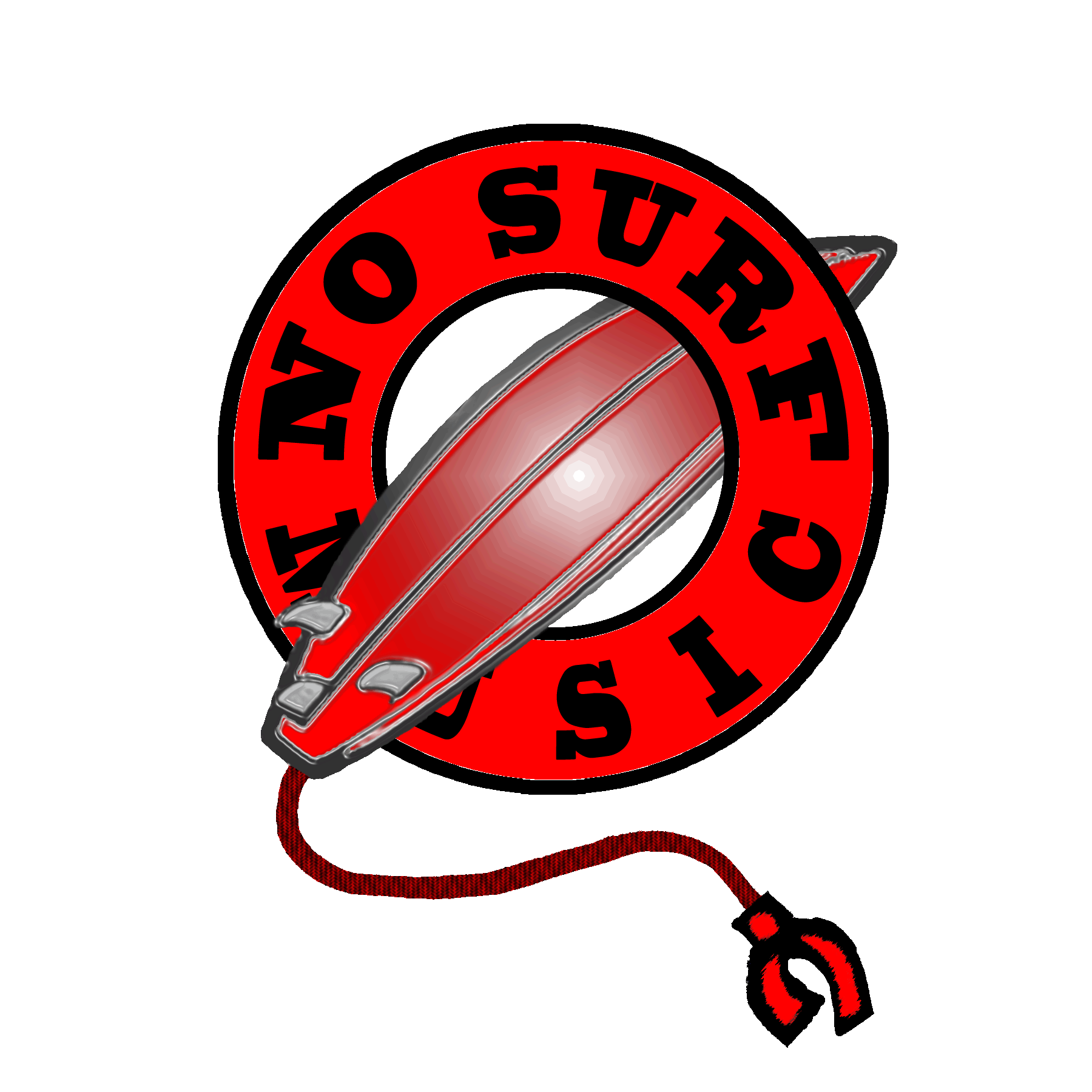
The Lowdown:
July 18, 2011
Lucinda Williams: Jacobs Pavilion at Nautica, 7/16/11
by Jason D. 'Diesel' Hamad
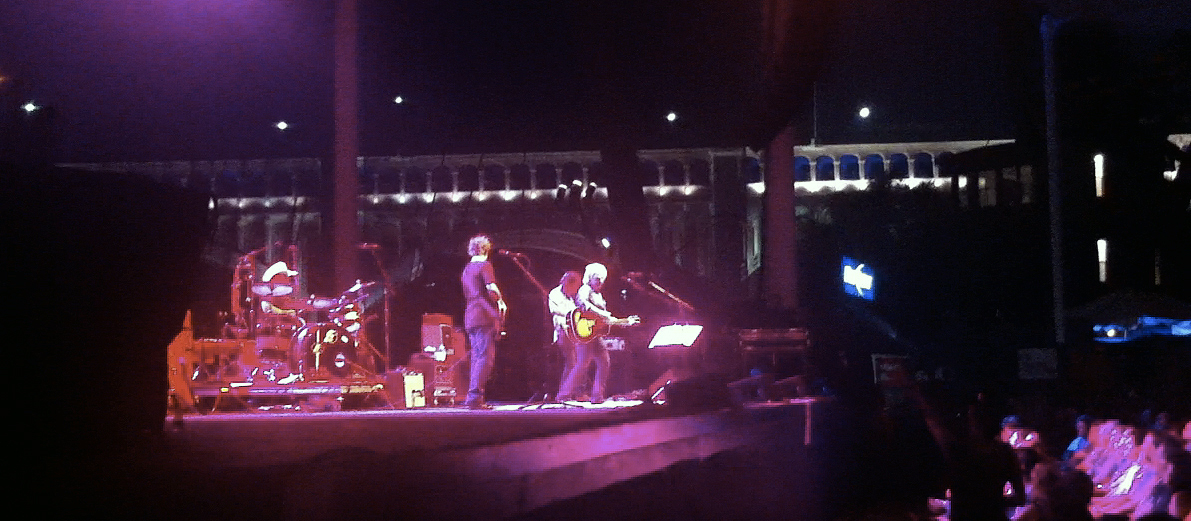
Lucinda Williams performs at Jacobs Pavilion at Nautica in Cleveland, Ohio. (l-r) Butch Norton (drums), David Sutton (bass), Blake Mills (guitar), Lucinda Williams (guitar/vocals). Photo by Jason D. 'Diesel' Hamad, No Surf Music.
There are several lessons to be learned from the recent Lucinda Williams concert at Jacobs Pavilion at Nautica in Cleveland. First, Lu has turned into the Rodney Dangerfield of the music world; she just gets no respect. Second, there is a proper way and an improper way to use backup singers. Third, even an off day with a master is a pretty damn good time.
Perhaps the most breathtaking features of Jacobs Pavilion at Nautica is the view behind the stage. On the left is the Key Tower, at the center the BP Building, then peaks of the famous Terminal Tower. At the right stands the rounded edge of the Federal Courthouse with the Veterans' Memorial Bridge (better known as the Detroit-Superior Bridge) in the foreground. The Cuyahoga River flows between the Flats District where Nautica sits and downtown. Photo by Jason D. 'Diesel' Hamad, No Surf Music.
More on that in a minute, but first let me set the stage. Jacobs Pavilion (usually just referred to as Nautica by locals) is one of the great unknown treasures in American musical venues. It is an absolutely perfect place for a show. An outdoor venue, it only hosts about 20 events every summer, due to Cleveland’s notoriously flakey weather. Still, on a breezy summer evening it is perfect. Boats float by on the Cuyahoga just behind stage and the city skyline dominates the background on the opposite bank, the famous Terminal Tower and Key Tower forming the peaks.
The venue was originally opened as Nautica Stage in 1987, and following a series of name and ownership changes over the years the current title of Jacobs Pavilion at Nautica was adopted this year. At its inception, the venue formed a cornerstone for the Flats, a collection of old flat-topped warehouses (thus the name) that was transformed into a then-booming bar district adjacent to the river, offering patrons the opportunity to moor their boats up right next to their favorite public house. With the decline of Cleveland as an industrial center the fortune of the Flats has been up and down (mostly down), but Nautica has survived due to its intrinsic appeal. In 2003 a renovation added a geometrically baffling canopy that Benoît Mandelbrot would have a hard time describing mathematically. Besides the breathtaking cityscape, one of the most charming aspects of the venue is the fact that it is nestled right next to the remnants of the neighborhood’s industrial past, with a beautiful brick building providing the back wall to the bleachers on the left side, a rusty old railroad bridge permanently raised on the right, and the gorgeous white arches of the Detroit-Superior bridge almost overhead. Even Williams noted during her set that it was a great place to play with the water just at her back and called the venue an “interesting architectural wonder.”
A view of the Nautica stage at left, with the flowing fractal shapes of the canopy covering the audience. Photo by Jason D. 'Diesel' Hamad, No Surf Music.
At No Surf, we have been eagerly awaiting this show ever since it was announced. Lucinda Williams is one of the greats in any genre of music and any opportunity to see her live is not to be missed. So it was with great expectations that we arrived at the pavilion ready to hear some awesome tunes.
Unfortunately, the realization of that expectation was long delayed. I got excited when I looked at the stage set-up for the first act and saw a stand-up bass, pedal steel and banjo, sure signs that this would be my kind of music. Check that. Sure signs until now.
The festivities were opened by Amos Lee, who may have a lot of critical acclaim behind him, but very little in the way of ability as an entertainer. He’s a little like a cross between James Taylor, Jimmy Buffett and Kermit the Frog. Now I’ll admit off the bat that I knew virtually nothing about him going in and haven’t experienced any of his studio work, but his stage presence was very near nil. What’s worse is that he somehow managed to overproduce a live show. Imagine a singer-songwriter who for some reason decided to hire a full band and then not actually use them to any positive effect. It was just a lot of instruments that didn’t really add anything to the music. What’s worse the backup singers actually detracted from most of the songs, making it harder to pick up on the lyrics, which were mostly generic and clichéd from what I could hear. I spent much of the set wondering how he could afford to pay that many people, much less why.
Amos Lee (in green) plays a set that was far too boring with a band that was far too large. The backdrop was far more interesting. Photo by Alan ' Pender' Pendergrass, No Surf Music.
Despite the superfluously large band, I don’t know if it would have been any better or worse had he done the set on his own. The set was pretty much just blah all the way through. When he called Ms. Williams up on stage to sing a number (“Clear Blue Eyes,” which they recorded together on his new album) it was obvious that she liked him a lot more than I did, although I honestly can’t imagine why. The only thing I can figure is that his lyrics actually are very good and I just couldn’t pick out enough to tell, but after this lethargic performance I won’t make any effort to find out. The crowd seemed happy, though, giving a rather enthusiastic response to some very unenthusiastic songs. A few even appeared to leave when he was done, although far more trickled in towards the end, awaiting the real show. After four songs I was eagerly awaiting the end of the set, yet it continued on for a full, virtually highlightless hour.
This is where the Rodney Dangerfield thing comes in. Mr. Lee, if that is his real name (which it is not) is being virtually co-billed with Ms. Williams on this tour. Even the posters devote as much space to him as to her. This is one of the great travesties in the history of music. Lucinda Williams is one of the most powerful talents music has ever known, and one of the greatest writers of the 20th century in any genre. Excepting a dream team-up with Bob Dylan and Bruce Springsteen, she deserves to be the all-out star of any billing.
Let me tell you a little story to illustrate. There was once a group of four young gents from Liverpool, England who formed a band with which you are probably familiar. They called themselves the Beatles, a play off of Buddy Holly’s Crickets. Early in their career, they had the opportunity to open for Roy Orbison, musical pioneer and possessor of the greatest voice in rock history. Later, after the group had exploded, Mr. Orbison was opening for them. They were the biggest band in the world. They were (arguably) bigger than Jesus. Still, the Beatles had so much respect for Roy that they insisted he get top billing. That’s class. By the same token, if Mr. Lee is mentioned at all in the billing for his shows with Lucinda, it should be in teeny tiny letters with an asterisk preceding. But such is the state of the American music industry that the blowing winds force the promoters to give someone with substantially less talent but substantial drawing power a place that is wholly undeserved.
Needless to say, I personally couldn’t wait for Lucinda to take the stage, and when she finally did she didn’t disappoint. After such an incredibly lack-luster set by her predecessor, “Can’t Let Go” was lively and impressive from the very first notes, and it was absolutely amazing how much better she sounded than the previous act.
Lucinda rocks out under the night sky, with the Detroit-Superior Bridge illuminated in the background. Photo by Jason D. 'Diesel' Hamad, No Surf Music.
The next selection was an interesting choice, “Crescent City,” off of her self-titled album released in 1988. Not one of her better-known compositions—even among Lucindaphiles like myself—it was nevertheless highly appropriate given the river behind her and her recent appearance featuring the song on the HBO series Treme, which chronicles life in New Orleans after Katrina. Lines like, “I’m goin’ back to the Crescent City / Where everything’s still the same,” are especially meaningful these days.
This was followed up by another barnburner with an absolutely overpowering sound, “I Lost It,” from Happy Woman Blues, later rocked up for her masterpiece Car Wheels on a Gravel Road. It came with a note that she’d written the song when she was living in Houston and the idea came from seeing a bunch of bumper stickers that read “I found it.” Only Lucinda and her beautifully dark mind could produce such a great song by turning such a positive statement into a negative.
Williams dropped her guitar so she could properly belt the next number, “2 Cool 2 Be 4-Gotten” from Car Wheels. Now, I’m not one of those people who feels that songs should be performed live exactly as they appear on the studio album—in fact I’m the opposite—but it was impossible not to note the odd phrasing on this performance, as if she were hurrying some of the words. It was still quite an awesome performance, but this particular aspect didn’t work for me. By definition, you can’t hurry cool.
This was followed by the slow and mellow “Fruits of My Labor” from World Without Tears—in a rendition that featured a stand-up bass and Lucinda’s voice at full effect—and then “Copenhagen”from her latest album Blessed. This is one of the few from this new release that I was truly hoping to hear, as it relies more than others on the quality of emotion in her voice. Not only was this well reproduced, but the lead guitar did a fine job recreating the sad, surreal sound absolutely essential to the song, and the extended musical break at the end was almost something out of a dream. Despite its intrinsic unthrilling nature, this song was a paradoxical highlight.
The next selections were “World Without Tears” and then “Born to Be Loved,” a jazzy selection off of her latest album that is as sweet as she gets (still kinda dark). Another tune from Blessed was next, but this one a full-on rocker, “Buttercup.” The song featured blazing guitar work and a strutting bass line. The withering, emotional derision dripped from her voice despite the song’s fast pace.
After this came “Essence,” a growling, powerful song, but this is where the night got a little weird. First of all, the strange phrasing was back in force, as she seemed to rush straight through the line “Baby, sweet baby” and the whole of the chorus. Then Williams erupted into an epic coughing fit. The band did their best to cover it up and it led to a pretty great impromptu guitar solo, but after wandering around stage for a few moments trying to recover, Williams just cut the song off. She apologized, saying, “I’ve got one of those tickles in my throat and when that happens there’s just not a damn thing you can do.” She promised they’d come back to the song and moved along. Well, hell, the show must go on.
Now I’m no singer, but I can see how “Essence” would be a particularly hard piece to execute. It’s one of those pieces where Lucinda’s famous growl is even more pronounced than usual, and that’s gotta play havoc on her throat. Yet I can’t see how “Righteously,” a blistering rap-abilly tune, would be any easier. Still, she came right back at it, even if the song seemed a little more sing-songy than usual. The massive musical attack at the end was right fucking on, and it’s hard to argue that the sentiment wasn’t there when she spat lines like “Be my lover, don’t play no game. / Just play me John Coltrane.”
Next came “Changed the Locks,” followed up by the song that is almost always the highlight of her live shows (and my personal favorite), “Joy.” There’s no need to go into details except to say that it was absolutely off the hook, and anyone who’s never heard the song done live has missed something essential in life. It wasn’t the most transcendent version I’ve ever heard, but there’s no doubt that it rocked hard and the highlight line “You took my joy. / I want it back.” was an exclamation point on the night.
After this absolute highlight, Lucinda sought to make amends, reprising “Essence.” This time it went off much more successfully, with a great guitar solo (this time right where it was supposed to be) and drum-banging insanity. At the end she just smiled and said, “See, it’s always better the second time around.”
Finally she closed with “Honey Bee,” another high-energy rocker and probably the only song really worth playing from the album Little Honey. At the end the tempo sped to a thundering pace just to add a last little touch of frenetic delirium to an already pulse-pounding set.
After the crowd had yelled itself out for a while, Williams returned to the stage alone, bearing an acoustic guitar and ready for the encore. She started into “Blessed,” the title track from her latest album. As she moved through the song, her band rejoined her on stage and the music built as it neared the end.
The penultimate song was both a strange and perfect selection, a cover of Buffalo Springfield’s “For What It’s Worth.” Despite the oddity of hearing Lu channel Stephen Stills, it’s a song that’s perfectly suited to her style and her general philosophy, which is the same kind of kick-ass progressivism that was evident in a certain segment of hippie culture in the 60’s. The song was highlighted by hot-stringed Neil Youngesque guitar, and that famous shuffling bass line was done perfectly. Also, note to Amos Lee: this is the proper way to use backup singers. Lu’s crew, who were silent through virtually all of the set—relying on their instruments to speak for them—added just the perfect amount of ooooh-ooohing flavor to the piece. When the guitar cut out leaving just the naked voices of the band and the crowd to sing a repeating chorus of “Stop. Hey, what’s that sound? / Everybody look what’s goin’ down,” it almost—but not quite—overpowered Williams’ own powerful compositions.
This song magically slid into an even more surprising selection to end the night, but one that turned out to be just as perfect: “Get Right With God” from Essence. The powerful rhythm built throughout the song until it slipped into sort of an African beat church boogie that had the whole crowd in a trance. The album version doesn’t begin to hint at the absolute transcendence that Lucinda accomplished in those brief moments on stage. The energy was absolutely palpable and barely contained by the pavilion’s fractal-like canopy, which momentarily transformed itself into a revival tent with Williams leading her flock in musical prayer. It was the perfect way to end the night.
With boats cruising by, the nighttime skyline provided the perfect backdrop for the close of the show.
“The balls on that woman not to play ‘Car Wheels on a Gravel Road’” were the first words out of No Surf writer Alan ‘Pender’ Pendergrass after we filtered out with the rest of the crowd. Anatomical inconsistencies aside, it’s easy to see how a casual Lucinda fan such as he might have felt the playlist lacked some “big hit” punch. But for someone as deep into Williams’ catalogue as I am, it was nice to hear a few of the great ones that aren’t as well known. Still, there are a host of selections that I would have liked to hear, and although virtually every album was represented there was a big exception: Lu’s second-best work West (an album that tops the best of almost any other musician). If anything, my biggest complaint would be that the show was too brief. Lucinda played for just under two hours, while the meritless, boring set that preceded her stretched on for an almost unendurable hour. If anything, Lee should have come on stage, said his name, apologized for even suggesting he should share the stage with Lucinda and then left Williams to play “Come On,” “Are You Alright,” “Real Live Bleeding Fingers,” “Metal Firecracker,” “Drunken Angel,” “Concrete and Barbed Wire,” “Car Wheels” or any of the other legion songs that were sorely missed.
Still, with a career as powerful and prolific as Lucinda Williams’, there’s no way to fit every song into every set, so the fact that some favorites were missed is wholly understandable. And there’s also no way that every set is going to be perfectly executed. Was this the best I’ve ever seen Lu live? No. Did she seem just a little off, even when she wasn’t coughing a lung onto the stage? Yes. But she’s human, and whether she was feeling under the weather or just tired, even an off night with a talent like Lucinda Williams is a great night indeed. I’m already anticipating the next time she comes to town.
| mp3 | cd |
|---|---|



